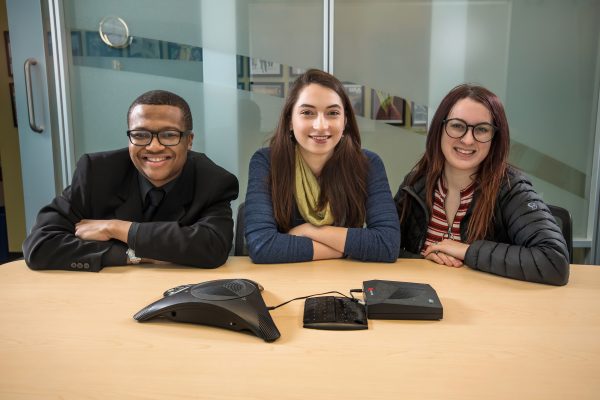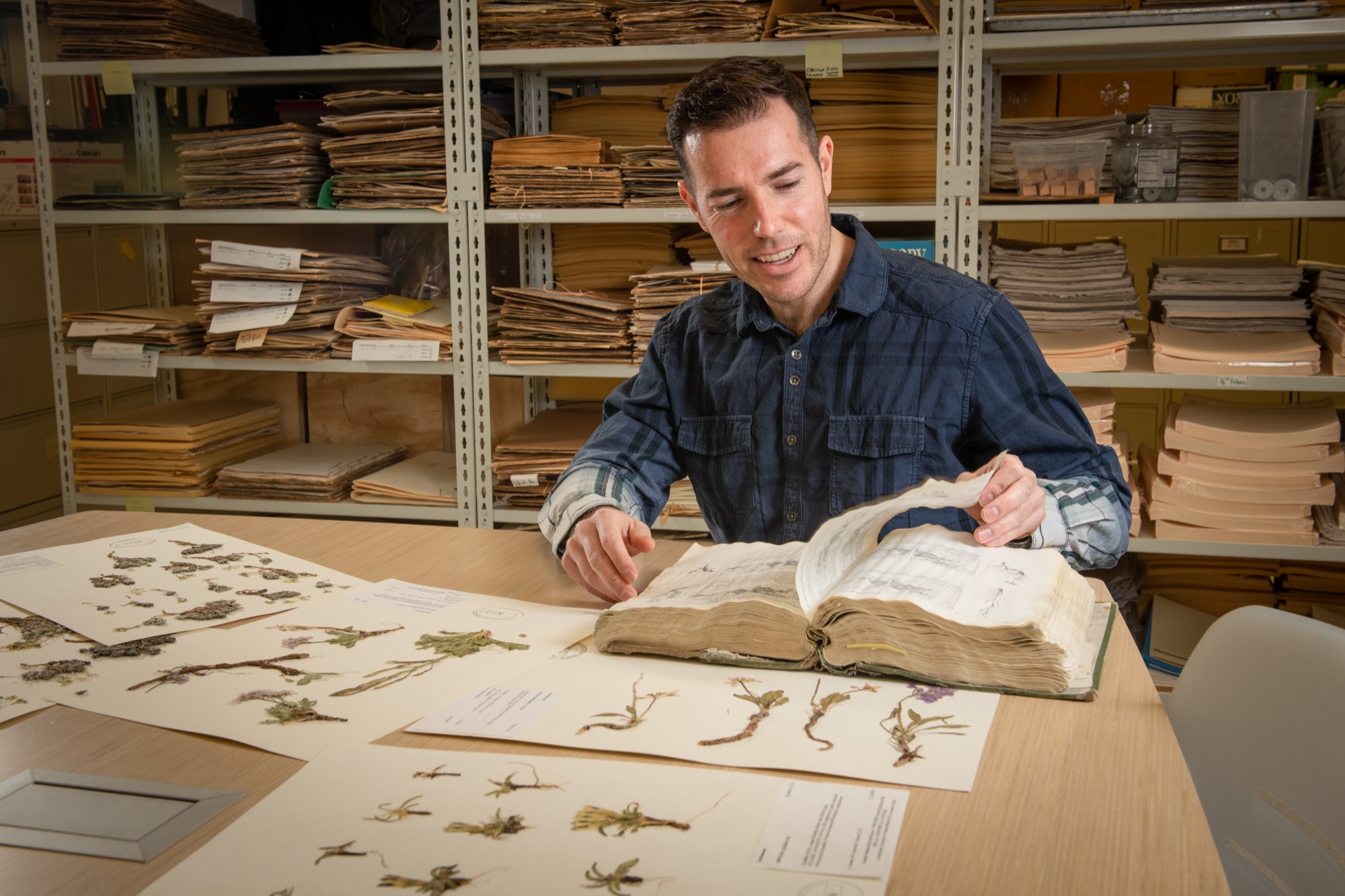A generation's debt inspires UAA's Public Service Scholars to open a dialogue for collaborative solutions
by cmmyers |

UAA Public Service Scholars. From left: Koby Scott, Lauren Criss-Carboy and Moira Pyhala spent the 2018 fall semester educating the community about the increasing debt Americans will face in the decades to come. (Photo by James Evans / University of Alaska Anchorage)
In 2017, the U.S. national debt surpassed $20 trillion - the highest it has ever been since 1950 - with potentially devastating consequences that will impact all facets of American life for current and future generations to come. With no indication of slowing down, the Congressional Budget Office, a nonpartisan entity, projects over the course of the next 30 years, that the federal debt, held by the public, will climb 150 percent, impeding our country's ability to invest in everything from new technology and infrastructure, to slowing down national and household economic growth.
Despite the grim outlook, university students nationwide are determined to search for viable, nonpartisan solutions to address the country's debt crisis through the Up to Us Campaign, a nationwide, campus-based program that allows students a platform to engage in collaborative dialogue over this contentious issue.
UAA's Center for Community Engagement and Learning (CCEL) Public Service Scholars (PSS) are hoping through education and creating an open conversation with their peers and community members, that Alaskans will understand the consequences of the growing national debt, and what it means for the 49th state.
It's up to us
"I don't know too many 20- to 25-year-olds that just strike up a conversation about the national debt," said Moira Pyhala, who graduated in December with a bachelor's degree in political science, a minor in women's studies and a certificate in civic engagement from CCEL. "It's something that has to be prompted to say, 'Hey, this is happening,' especially because there are so many issues going on right now, it's often forgotten."
The PSS program offers students the opportunity to participate in a civic engagement activity and act as a liaison between UAA's campus community and the public when addressing social issues such as the Alaska environment, arts, language and culture, or justice issues. This year, the PSS group of five students ranging from sophomore to senior, chose to tackle the national debt crisis by joining university students nationwide in the Up to Us Campaign.
"It seemed like the more we learned about the national debt and these fiscal policy issues - at least for me, coming from UAA - all these things have a trickle-down effect," said Lauren Criss-Carboy, a sophomore majoring in international studies with a focus in Northeast Asia, minoring in sociology and working on earning her civic engagement certificate from CCEL. "We're addressing things like the education budget and how that will impact tuition or wage growth for our generation."
When beginning the project, she and the other PSS group members were not well-versed when it came to the national debt. But the more they dug into the research and learned of the major impacts it would have on their lives and future generations, the more they realized they needed to lend their voice to the matter.
Education is key
As national news covers many pressing issues, coverage of the country's creeping national debt tends to get lost in the headlines. But what the PSS students learned through their work with the Up to Us Campaign during the fall 2018 semester, it's a problem that's not going away anytime soon. In fact, the national debt is going to keep increasing unless people start taking notice and working toward collaborative solutions.
"I think something that was really hard, that we struggled with for this campaign, was that this issue is kind of above our heads," said Pyhala. There's nothing we really can do as individuals to stop it, but collectively, if we can educate people, we can at least bring awareness of what our future might look like."
The group spent the fall 2018 semester tabling in the Student Union to raise awareness and educate UAA's student body of the debt crisis. In November, the group hosted a public World Cafe event to bring collaboration around the national debt topic. Criss-Carboy said a lot of the information they provided during tabling and approaching students in the SU, was general - knowledge to understand the basics on the national debt like the total current amount, the impacts facing future generations and the main causes driving the debt. Criss-Carboy and Pyhala said there is no right or wrong approach to finding a solution to this problem and, despite party lines, this is a bipartisan issue that will take work from both sides of the political aisle.
"I think by educating people and having a bipartisan campaign we bring people together, Pyhala said. "There is no right or wrong solution, but we do have to work together." Criss-Carboy said that in addition to jumpstarting the conversation with students on campus, the PSS group encouraged students to reach out to their political representatives to take action.
"We're not endorsing anything; we're presenting the history of the national debt and its drivers, how it will impact our generation, and how we can encourage collaboration by speaking to our representatives and encouraging them to work across the aisle to find solutions," Criss-Carboy said.
Next steps
The group agreed that the country's looming debt is pretty frightening, especially as they are about to enter the workforce and know the burden they and their peers will share when it comes to the national debt.
"It's not really something we can fix overnight or even the next five to 10 years," Pyhala said. "It's happening - we're going to be in debt as a country for a very long time."
And the group isn't saying that the national debt is all bad or that it should be at zero, but it's the swiftly rising trajectory it's on that's causing the most concern.
"It's more about looking at the consequences and what are the ones we're willing to accept?" Criss-Carboy said. "We're really just trying to look at the long term effect this is going to have on our futures."
It's a huge issue our country faces, and the PSS group acknowledges that looking at the numbers makes you want to run and stick your head in the sand. But if anything, over the course of the fall semester, they've learned that baby steps turn into strides and strides turn into action - tangible action that can turn into change.
"I sometimes have that perspective. I mean, we did this tiny little campaign on our university; we're not necessarily influencing policy change," Criss-Carboy said. "But just being able to talk to students, some of who didn't know about the issue or weren't registered to vote and ended up signing the pledge to communicate with their representative, that in itself is civic action. For me, it was all about those small things and starting those conversations."
Written by Catalina Myers, UAA Office of University Advancement
 "A generation's debt inspires UAA's Public Service Scholars to open a dialogue for
collaborative solutions" is licensed under a Creative Commons Attribution-NonCommercial 4.0 International License.
"A generation's debt inspires UAA's Public Service Scholars to open a dialogue for
collaborative solutions" is licensed under a Creative Commons Attribution-NonCommercial 4.0 International License.














